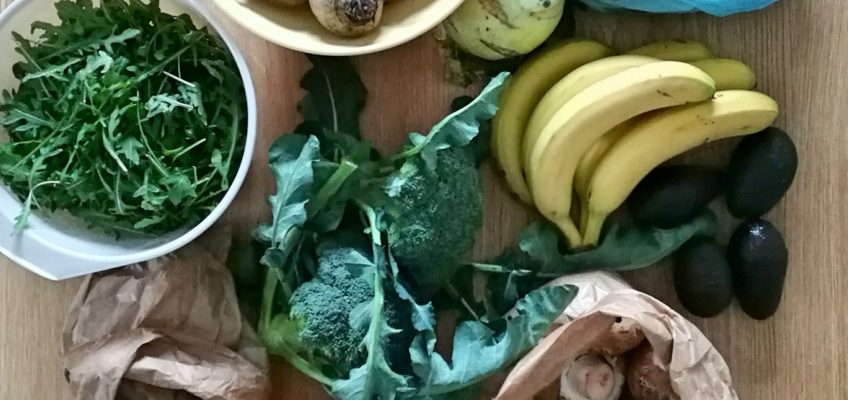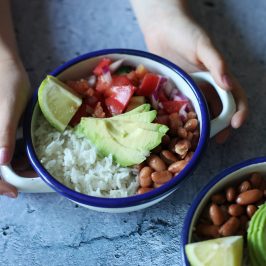If you are looking for ways to live more sustainably and create a healthier lifestyle, I have a few thoughts I’d like to share with you. Maybe you’re considering a plant-based or vegan diet? Or you want to be more conscious about what you eat and how it affects your health and the world around you?
The types of food we choose to put in our body — and how we source that food — not only affects our health and wellbeing but also has a significant impact on the health of our planet. The good news is, it is really not difficult nor complicated to develop eating habits that are healthy and environmentally friendly.
Here are 3 simple things you can start doing today to take action, eat more sustainably and also help reduce (y)our carbon footprint.

1. Buy local
Buying locally grown food helps reduce fossil fuels required to transport food long distances. It also beneficial to the local economy, farmers, and other producers. Check out what locally sourced options are available in your area, like farmers markets, grocery coops, or CSAs (community-supported agriculture). When possible, buy in bulk to minimize excess packaging > Click here to check out how I stock my pantry
Locally grown produce is more likely to be in season and more sustainably produced, rather than out-of-season produce that relies on unnatural conditions to grow such as high-energy lighting and heating, and longer travel to reach grocery stores. If you have a green thumb and have space for it, also try to consider starting your own vegetable garden — it doesn’t get more local than that! 🙂

2. Eat less meat and more plants
The livestock industry depends on massive amounts of water consumption, land use for grazing and is a significant source of greenhouse gas emissions including methane, carbon dioxide, and nitrous oxide.
Eating less meat can benefit the planet and may also boost your health. Rich in whole grains, vegetables, fruits, and healthy fats such as olive oil, a vegetarian or vegan diet can help reduce the risk of heart disease, diabetes, and obesity.
If you’re not ready to go completely meat-free or vegan, you can ease into it by replacing just a few of the animal-sourced foods in your diet with plant-based alternatives. For example, designate one day of the week for trying out a new plant-focused meal. You might be pleasantly surprised at the variety of delicious options available. > For some inspiration, check out here my recipe index
3. Compost your kitchen scraps
It’s estimated that between 30% and 40% of food goes to waste each year in the United States. One simple way to reduce food waste in your home is to compost kitchen scraps like banana peels, coffee grounds, and vegetable peelings. Composting breaks down food waste naturally, resulting in nutrient-rich fertilizer — or humus — which can be used as a supplement to improve the quality of the soil. Although it’s best to avoid lots of leftovers and excess groceries, if you end up with food that has gone bad, composting is a better alternative than simply throwing it away in the trash.
You can purchase a backyard compost bin at most home improvement stores, or you can build your own with pallets and chicken wire. Some counties offer organics collections in addition to weekly trash and recycling services.
In addition to reducing food waste in landfills, composting reduces the need for pesticides and chemical fertilizers, and helps suppress plant diseases.
a few final thoughts…
The type of food you choose to eat, and the way that food is sourced, can make a big difference in your health and the environment. By incorporating these practices into your day-to-day routine, you’ll be well on your way to a more sustainable and earth-friendly lifestyle.













Leave a Reply